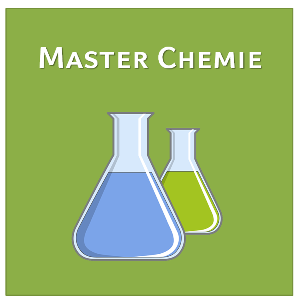Lab courses in the Master program
There are no online-registrations for lab courses in the master program of Chemistry (exceptions below). Any student has to care and to apply independently for a place in a research group. The arrangements (e.g. beginning) will be fixed directly with the supervisor. At the end, a report has to be submitted to the supervisor at least 4 months after the beginning (possibly including a presentation).
Due to the decision of the examination committee it is not allowed to do the lab courses (F-Praktika) in the same research group where the Bachelor thesis was done.
Before starting any of the advanced lab courses (F-Praktikum) in the chemistry master program, you have to fill in a registration form (PDF, 199 KB)and to sign it by the supervisor - as well doing external lab courses (see below)! Then, you have to submitt this registration form in the Examination Office in room F5.020. Please fill in the questionary which is also avaiable in F5.020 tp give us your feedback.
Inorganic Chemistry
- T1IA: Lab course in major
The advanced lab course (F-Praktikum) and Seminar in IC (16 SWS; 12 ETCS) can be carried out with the agreement of the group leader (supervisor), i.g. it can start at any time and continues for ca. 6 weeks (full-time).
Registration for the student presentations of the AC-F-Praktikum - T1IB: Lab course in minor
The lab course in the IC minor (10 SWS; 9 ETCS) can also be carried out with the agreement of the group leader (supervisor), i.g. it can start at any time and continues for ca. 4 weeks (full-time).
Organic Chemistry
- T1OA: Lab course in major
The advanced lab course (F-Praktikum) and Seminar in OC (16 SWS; 12 ETCS) can be carried out with the agreement of the group leader (supervisor), i.g. it can start at any time and continues for ca. 6 weeks (full-time). - T1OB: Lab course in minor
The lab course in the OC minor (10 SWS; 9 ETCS) can also be carried out with the agreement of the group leader (supervisor), i.g. it can start at any time and continues for ca. 4 weeks (full-time). - T1OX: Lab course in Chemical Biology (only in WiSe) in major
The lab course in the minor Chemical Biology (10 SWS; 9 ETCS) takes place only at the end of the winter term (in March) for 4 weeks (full-time).
Please register here.
Physical Chemistry
- T1PA: Lab course in major
The advanced lab course (F-Praktikum) and Seminar in PC (16 SWS; 12 ETCS) can be carried out with the agreement of the group leader (supervisor), i.g. it can start at any time and continues for ca. 6 weeks (full-time). - T1PB: Lab course in minor
The lab course in the PC minor (10 SWS; 9 ETCS) can also be carried out with the agreement of the group leader (supervisor), i.g. it can start at any time and continues for ca. 4 weeks (full-time).
Theoretical Chemistry
- T1TA: Lab course in major
The advanced lab course (F-Praktikum) and Seminar in TC (16 SWS; 12 ETCS) can be carried out with the agreement of the group leader (supervisor), i.g. it can start at any time and continues for ca. 6 weeks (full-time). - T1TB: Lab course in minor
If you have not visited the TC 1-Praktikum (Computational Chemistry) in the BSc, then it is also possible to take the course for the TC minor.
The lab course in the TC minor (10 SWS; 9 ETCS) can also be carried out with the agreement of the group leader (supervisor), i.g. it can start at any time and continues for ca. 4 weeks (full-time).
Guidelines for advanced external lab courses in the Master program
Before starting any advanced lab course (F-Praktikum) in the chemistry master program, you have to fill in this registration form (PDF, 199 KB) and to sign it by the supervisor! You can also get this registration form in the Examination Office in room F5.018, where it has to be submitted afterwards.
Advanced lab courses can also be performed external of the LMU Departments of Chemistry or Biochemistry (in Germany and also abroad). In this case you should take care of the equivalence e.g. workload (SWS) or duration of the course. To acknowledge the credits of an external lab course you have to find an official supervisor at our departments (= Prüfungsberechtigter) who is working in a related research field.
According to the regulation of the Examination Committee only one advanced external lab course can be accepted in the Master of Chemistry.
If the official supervisor has accepted, he/she rates the report with a mark and transfers this information to the Examination Office if the lab course has been passed.
Financial help for external lab courses may be found at:

